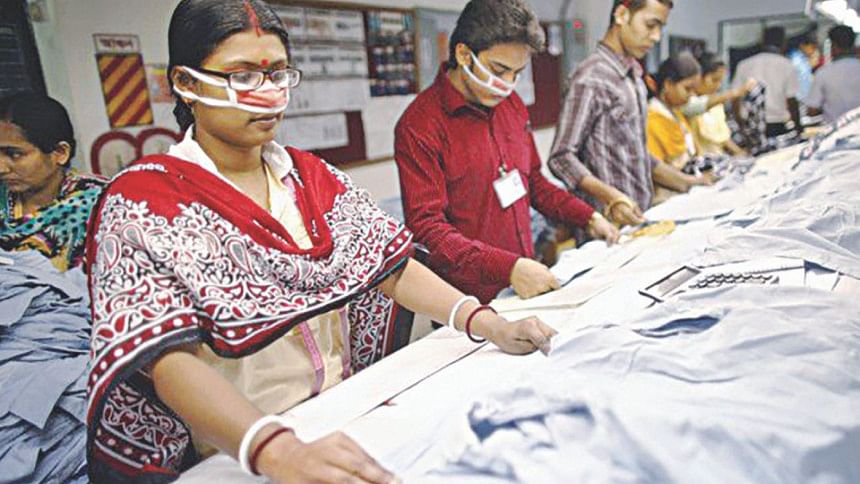Rethinking the fashion business model

Since 2009, the largest global summit on sustainability in the fashion and manufacturing sector has been hosted in Copenhagen, Denmark. Copenhagen Fashion Summit has carved out a niche as the world's leading business event on fashion and sustainability. The event is also known as "The Davos of Fashion", drawing decision-makers and thought-leaders from the global fashion industry to discuss the agenda-setting topics on the most critical environmental, social and ethical issues facing the industry.
Since 2013, Bangladesh had only been mentioned at Copenhagen Fashion Summit in connection with the unfortunate Rana Plaza incident which has become the global symbol of what challenges the textile and apparel industry faces in terms of a sustainable supply chain. Bangladesh happens to be the second largest exporter of readymade garments (RMG) in the world. We shipped about USD 29 billion worth of RMG around the globe in 2017. Our GDP and future growth opportunities are largely dependent on the success of this industry and continuous partnership with the Western brands and ultimately their consumers.
During this year's Copenhagen summit, I have had the opportunity to represent Bangladesh and to join the opening panel debate on transparency in the textile and apparel industry. The panel debate was hosted by Leslie Johnston from the C&A Foundation and also included a representative from Target, one of the largest fashion retailers in the US and G-Star, a European jeans brand that has pioneered the next generation of jeanswear. In recent years, Bangladesh's RMG sector has witnessed huge improvements in terms of safety, sustainability and workers' rights, and it was a privilege for me to share these developments with them.
The fact is, there are both opportunities and threats associated with our current business strategy. The Western consumers are increasingly asking for sustainable products manufactured following environmental and ethical standards. How can we stay in the business under such a circumstance? How do we brand our textile and fashion industry and respond to the changing needs of the Western consumers in terms of sustainable production methods? Over the next decade, Bangladesh will strive to further develop its competitiveness in order to stand out from the crowd of competing countries and gradually move towards value-adding services and sustainable production methods to stay ahead of the competition.
Currently, more and more international buyers are requesting innovative production methods. Sustainable and ethical value chains are set to be the norm. The question is how Bangladesh can transform its own textile and fashion industry to meet the demands for sustainable and ethical manufacturing. We need to remodel our business strategy in light of the changing needs of the time so we can stay competitive in the future.
But vision is one thing, and reality another. During the Copenhagen Fashion Summit, I raised some questions that are rooted in the reality of everyday implementation. For example, the biggest barrier to transparency in the supply chain is cost. Who will pay for sustainability, and who is picking up the cost? Today, every manufacturer has to pay for certifications and audits. In order to cover that extra cost, the product price needs to increase; but not many international retailers and brands are willing to raise the retail price to their consumers. Is there a way to share the burden across the entire value chain? Are there other business models that need to be explored? There are talks about circular economy and shared economy. Increasingly, there is a need for models in the global fashion industry where all parts of the value chain must be seen as co-dependent from design to manufacturing to the end consumer.
It is like one eco-system. And this eco-system needs new business models in order to move to the next step in sustainable business and not only within the top fashion industries, but also other industries that collectively impact issues such as CO2 emissions, water wastage, pesticide pollutions, workers' rights, health and safety. We need to see new business models associated with the circular economy and rethink the way we produce across the supply and value chains. If the bottom line does not follow, change will be difficult in the future.
Sustainable value chain was one of the focal points of discussion at the Copenhagen Fashion Summit. Manufacturers in Bangladesh are part of the global value chain which starts with a designer creating a product and finishes with a consumer buying that product. The entire value chain is in play here. This obviously raises questions about the unification of one clear labelling benefitting the consumer but impacting the entire eco-system of the value chain. We need a clear agreement on labelling. We need to discuss and solve the issue of a transparent labelling and certification concept in which the entire value chain works together in delivering to the needs of the consumer, and ultimately the environment.
Equally importantly, there should be a level playing field globally, where everyone needs to be held accountable. Transparency is the first step towards a different culture in the fashion and textile industry. And everyone has to be equally transparent. We need high-level engagement and support from the buyers, brands and retailers as the consumers are demanding a pull towards sustainability. Today, various countries, trade organisations and even the EU are working on possible solutions for a globally recognised labelling system which will visually inform the consumer if the product they are about to purchase is made ethically. The process has begun but lots of issues remain unresolved. Imagine if we could facilitate a meeting in Bangladesh and push for further results by unifying all the key players!
Mostafiz Uddin is the Founder & CEO of Bangladesh Apparel Exchange (BAE) and Bangladesh Denim Expo. He is the Managing Director of Denim Expert Limited.
Email: [email protected].





Comments